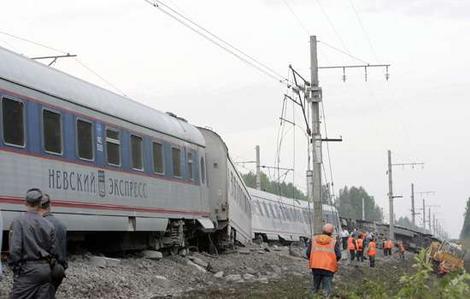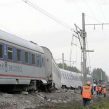
MOSCOW BLAMES TERRORISTS FOR TRAIN DERAILMENT
Publication: Eurasia Daily Monitor Volume: 4 Issue: 159
By:

On Monday, August 13, a high-speed express passenger train traveling from Moscow to St. Petersburg derailed in Novgorod region after a remote-controlled landmine exploded under the tracks. Thirteen train cars were derailed, 60 people were injured, some of them seriously, but there were no fatalities. The Russian authorities described the bombing as “terrorism” and said that a higher casualty toll was averted only by chance. After the explosion the train, the Nevsky Express, managed to cross a small bridge river without any of the cars plunging into the river below.
Russian authorities say the attack was carried out by “skilled professionals” and seems similar to the June 2005 bombing near Moscow of a passenger train coming from Grozny, Chechnya. Two Russians, accused of being extreme nationalists, were convicted and handed long prison sentences for the 2005 bombing (Itar-Tass, Interfax, RIA-Novosti, August 14).
At an August 14 meeting of the National Anti-Terrorism Committee, which coordinates all governmental anti-terrorism activities, the director of the Federal Security Service (FSB), Nikolai Patrushev, announced that the threat of terrorism has not been eliminated. He cited the train bombing and the ongoing situation in the Northern Caucasus, “where in the last two months armed attacks have increased against government officials, law enforcement officers and judges.” The Committee also discussed security measures for the December State Duma elections and the presidential elections next March. That the train bombing occurred before the Committee meeting seems to be a coincidence (RIA-Novosti, August 14).
Former FSB director Nikolai Kovalev, now a leading Duma deputy from the ruling United Russia party who retains good connections with the intelligence community, directly linked the train bombing with current anti-terrorist operations in Ingushetia (Interfax, August 14). Last week the Interior Ministry announced it had sent an additional 2,500 servicemen into the tiny North Caucasus autonomous republic of Ingushetia, tripling the number of Russian federal Interior Ministry troops deployed there. The troop buildup is related to an anti-rebel “complex preventative operation until the end of August.” At the same time, it was announced that Ossetian Interior Ministry troops are also concentrating forces on the Ingush border (Interfax, August 10).
During the fighting in Chechnya in the 1990s, Ingushetia was a peaceful haven, a truce zone where Russian officers and Chechen separatists alike could relax from the stress of warfare. But since 2000, Moscow has done its best to eliminate the unofficial truce zone in Ingushetia. The area has since seen an increase in rebel and terrorist attacks. In the 19th century, Russian soldiers destroyed the dense woods in Chechnya, which were a traditional sanctuary for guerrillas, over more than 50 years of war with rebel Islamists, lead by the Imam Shamil. During that war, the Ingush people, who are very closely related to the Chechens, were loyal to the Russian tsars, and the dense woods in the mountainous south of Ingushetia survived the Russian conquest of the Caucasus. Today these steep hills covered by dense forest provide good cover for the rebels.
In recent years, Russian troops, supported by attack helicopters, have frequently chased large groups of armed rebels into Ingush forests, only to lose contact as they dissolved in the wilderness. Indiscriminate bombing and shelling has not been effective. With a rebel haven nearby, the latest Russian “preventative operation” in Ingushetia will most likely be counterproductive: Genuine rebels will escape, while the civilian population will be abused, as is customary with Russian anti-terrorist cleansing operations. This abuse only fuels anti-Russian feelings, which could possibly lead to terrorist bombings of express trains, according to the security forces. The Nevsky Ekspress attack can hardly be blamed on Russian nationalists, as with the 2005 attack on the Grozny-Moscow train, since most of this week’s passengers were ethnic Russians.
In August 1999, Russia was shocked by a series of deadly apartment block bombings in Moscow and other cities. The terror created by the bombings produced massive public support for the invasion of Chechnya that propelled the previously unknown Vladimir Putin, then just appointed prime minister and President Boris Yeltsin’s successor, into becoming a highly popular leader. The true origin of the apartment bombing attacks was never established with certainty. The Kremlin accused Chechen rebels but did not manage to legally prove its case beyond any doubt. Putin’s political opponents, including ex-spy Alexander Litvinenko, who was poisoned in London by polonium-210 last November, accused the FSB and Putin, who before August 1999 was FSB director, of preparing the apartment bombings, but could not legally substantiate the accusation either.
Today, as Russia again prepares for elections, Putin’s successor could emerge from the pack of contenders by leading a charge to destroy rebels. Alternatively, Putin himself might be “forced” to agree to run for a third term in order to save the country from the terrorist threat. To serve such ends, more indiscriminate bombings in Russia may happen or some new war may begin in the Caucasus.




